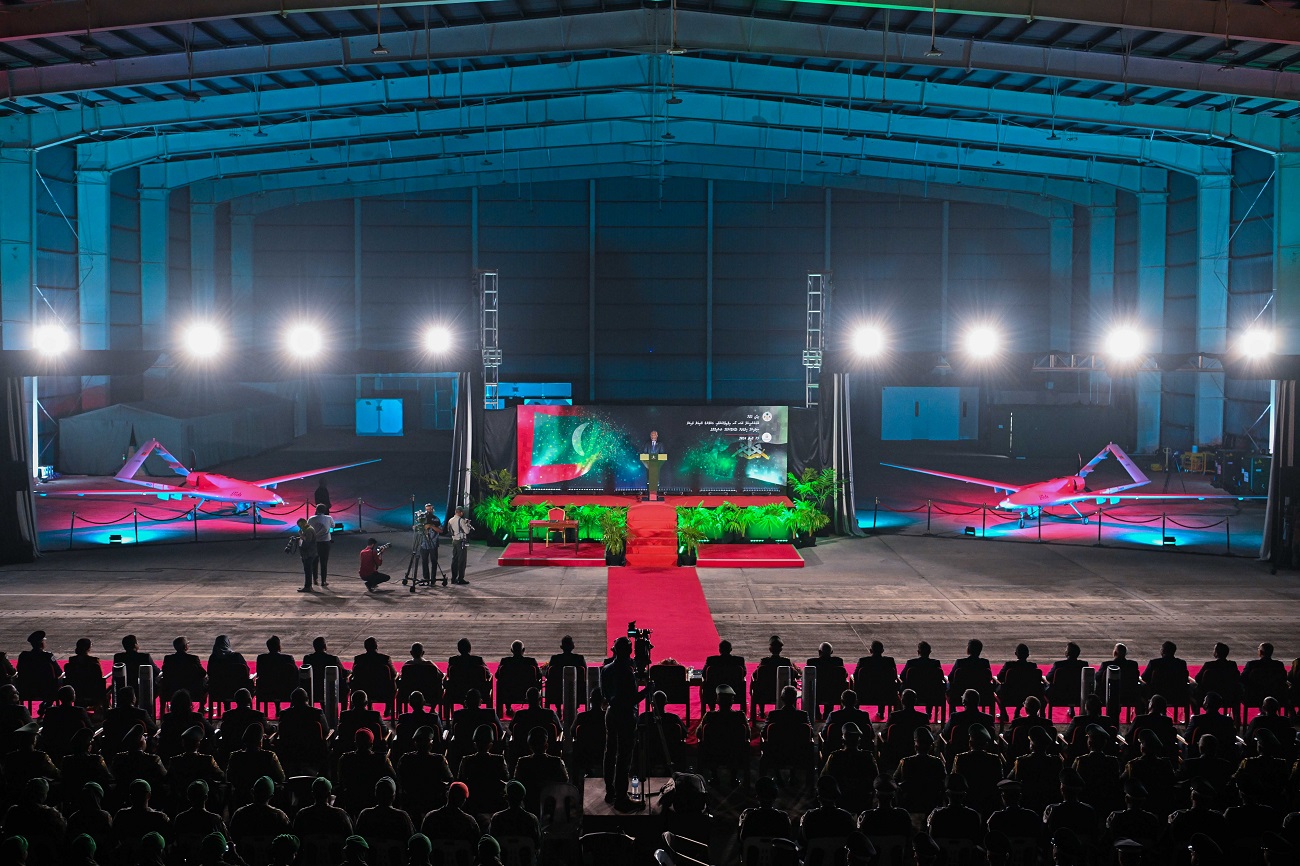President Dr. Mohamed Muizzu has launched the drones acquired for Maldives National Defense Force (MNDF) at Maafaru International Airport in Noonu Atoll on March 15. The unmanned combat aerial vehicles were launched, and President Muizzu signed the order permitting the operation of operations during a ceremony held for the purpose at N. Maafaru airport. Following launching, one of the drones was flown before the President. Two ‘Bayraktar TB2’ drones were acquired under an agreement executed with the Turkish government. By incorporating Baykar’s surveillance drones, efforts have begun to establish a drone base in Noonu atoll Maafaru to operate the military drones and conduct monitoring of the Maldives’ ocean territories. The drone, capable of conducting surgical precision strikes, will be operated by a special team of the MNDF.
The Bayraktar TB2 is a medium-altitude long-endurance (MALE) unmanned combat aerial vehicle (UCAV) capable of remotely controlled or autonomous flight operations. It is manufactured by the Turkish company Baykar Makina Sanayi ve Ticaret A.S., primarily for the Turkish Armed Forces. The aircraft are monitored and controlled by an aircrew in a ground control station, including weapons employment. Turkey has used the drone extensively in strikes on Kurdistan Workers’ Party (PKK) and People’s Protection Units (YPG) targets in Iraq and Syria. Bayraktar drones were later deployed by a number of other nations around the world in various wars, such as by Azerbaijan in the Second Nagorno-Karabakh War, by the Armed Forces of Ukraine during the Russian invasion of Ukraine, as well as by the Ethiopian National Defense Force during the Tigray War.

The Bayraktar TB2 platform has a blended wing body design with an inverted V-tail structure. Thrust is generated by a variable pitch two-blade propeller in pusher configuration. The drone measures 6.5 meters in length and has 12-meter wings. It weighs approximately 700 kilos. The drone has a communication range of up to 300 kilometers and a payload capacity of 150 kilograms.Equipped with the most up-to-date technology, the drone can fly for 27 hours at a speed of 70 to 120 knots. It has an operational maximum altitude of 18,000 to 25,000 feet.The propeller is mounted between the tail booms and driven by an internal combustion engine located in the body. The monocoque platform is modular with detachable main items such as wing, tail boom, and V-tails. Fuselage pieces are made mostly of carbon fiber composite with machined aluminum parts at joints.
While the Turkish Armed Forces describes Bayraktar TB2 as “Tactical UAV Class” to prevent it from being a competitor to the TAI Anka UAV, international standards would classify it as a medium-altitude long-endurance UAV. The ground control station (GCS) is based on a NATO spec shelter unit which is equipped with cross redundant command and control systems. The mobile unit supports three personnel: pilot, payload operator and mission commander. The GCS is equipped with redundant air conditioners and nuclear, biological and chemical filtration (NBC) filtering unit. All hardware inside the shelter is placed inside racked cabinets. Each operator has dual screens in front along with the operator interface software used for real-time command, control and monitoring. In addition to its capability to conduct intelligence surveillance operations – the drone can also carry out attack missions. The Turkish military has successfully used the drone in its operations since 2014.















